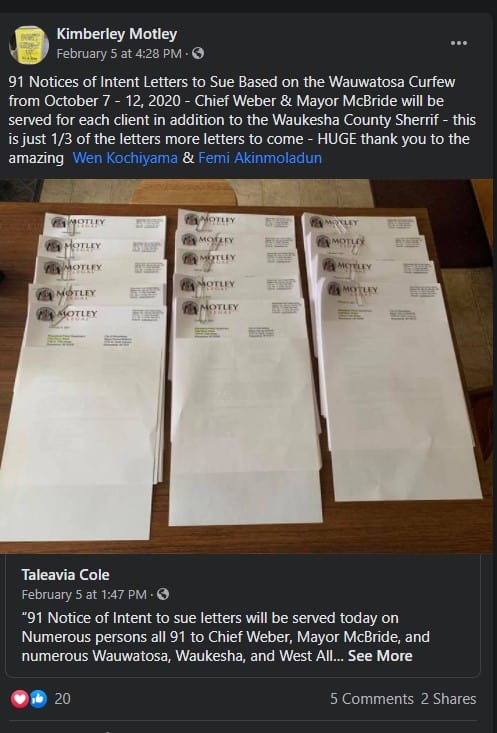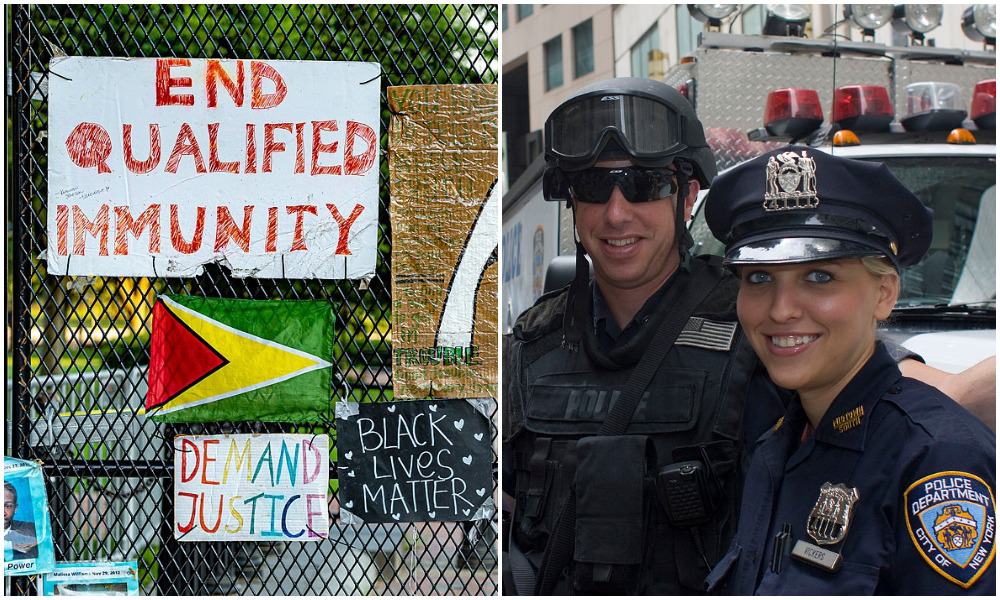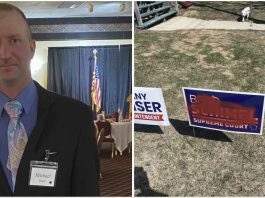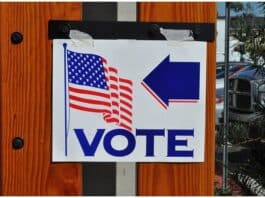It’s “defund the police 2.0.” While we’re at it, let’s remove absolute immunity for legislators, judges and district attorneys who actually have time to think through decisions.
Qualified Immunity Pros and Cons
Last week, Democrats re-introduced the George Floyd Justice In Policing Act of 2020, named after a man who died, as shocking as the video was, with a lethal amount of drugs in his system, a severe heart condition, had COVID and was fighting with police after committing a crime.
This led to a summer of violence, destruction, looting, assault, and murder. Progressives used this carefully concocted lie to convince Americans that police must be defunded. However, the “defund the police” narrative has failed; that’s proved by what is happening in Minneapolis where violent crime has spiked.
So leave it to the left to try something new to weaken law enforcement by eliminating qualified immunity, or “defund the police 2.0.”
Homicides and violent crimes are rising at shocking rates in Milwaukee and many other large cities. More than ever, qualified immunity is imperative to allow police to do their jobs without fear of baseless legal actions that could ruin their reputations, careers and financial well-being.
Removing qualified immunity will expose police officers to frivolous lawsuits, in which judges and juries could second-guess split-second decisions made by officers in good faith with a Monday morning quarterback perspective which will lead to significant financial exposure to the individual officers (or cities, if they give officer’s liability protection).
It is unreasonable to expect officers to be legal scholars and think through legal arguments when attempting to take immediate action. We don’t ask this of other officials, including prosecutors and legislators, who are allowed to make discretionary decisions, even arguably wrong but good faith ones, without fear of constant lawsuit.
The U.S. Supreme Court has found: “Qualified immunity balances two important interests—the need to hold public officials accountable when they exercise power irresponsibly and the need to shield officials from harassment, distraction, and liability when they perform their duties reasonably.” It’s the second part that liberals want to remove.
It must be emphasized: qualified immunity grants police officers performing discretionary functions immunity from civil suits unless the plaintiff shows that the officer violated “clearly established statutory or constitutional rights of which a reasonable person would have known.” It’s important to note that police do not have absolute immunity, which is enjoyed by elected officials, judges and district attorneys. More about that later.
In addition, qualified immunity doesn’t just apply to police officers. State governors, school teachers, prison officials – all government workers – are protected. But they only want to strip police officers of this protection, even though they have the toughest, most challenging jobs.
They’re the ones who have to make the split-second critical decisions. In what other profession do people have to make immediate decisions that could severely alter the course of their lives? Legislators, judges, and others don’t have to make such immediate decisions. They get to sit around and think about it. But they get even stronger protection?
How can society truly weaken law enforcement? Do this.
Defund the police proponents presumably realized that only big urban departments will be defunded while surrounding suburbs still enjoyed strong police departments (and less crime as a result). Eliminating qualified immunity is a way to systemically weaken, if not destroy, every police department in America. It’s “defund the police 2.0.” Worse, many people don’t understand what “qualified immunity” means, so they might buy the left’s false narrative that it will only “make it possible to hold bad cops accountable.”
No. It will open the floodgates for mercenary trial attorneys to go after average cops personally, including their homes and bank accounts. If you think they would only target the “truly bad” police officers (of which there are a few), you haven’t been paying attention. The people who think curfew tickets are “racist,” for example? Will they sue each officer personally? Even if exonerated, the punishment would be in the process and the costs and stress of fending off constant lawsuits.
Here’s what will happen:
Police officers require qualified immunity to perform their jobs. Police officers perform vital tasks that require split-second decisions under stressful circumstances. The absence of qualified immunity will lead officers to be hesitant to act when action is imperative.
If you want to recruit qualified officers, forget it. Who in their right mind would open themselves up to such personal liability? Every officer capable of retiring will do so. You have to protect your family. This will subject the community to a less qualified, younger police force lacking the cumulative wisdom and training of veterans. Would this be retroactive? What if it is? What if every officer can be retroactively sued personally for every decision someone didn’t like? Can pensions be targeted?
Police should not be held personally liable for actions taken to keep the public safe. During the heightened period of violence in our country, the courts recognized the important role police play in fighting crime and keeping neighborhoods safe and gave them the protection they need to do so without fear and risk of baseless civil actions.
Police officers must be allowed to make good-faith mistakes or have moments of bad judgment without worrying about being a defendant in a civil action. Otherwise, they will just freeze and take no action for fear that they and their family will be financially ruined if they make the wrong call in the eyes of a jury.
Just last month, attorney Kimberley Motley sent out “Notice of Intent” to sue letters to city and county officials along with “numerous Wauwatosa, Waukesha, and West Allis police officers” for actions taken to enforce a curfew during protests and rioting in October. If not for qualified immunity, each of these officers would have to hire their own attorney and fight these allegations, costing them time, money, and added stress.

Absolute Immunity
Absolute immunity provides both criminal prosecution and civil protection to judges, prosecutors, and legislators for actions committed in their official duties as long as those actions do not have malice or corrupt motives.
It’s ironic that these Democratic legislators, who insist on removing qualified immunity from police officers, will still enjoy absolute immunity and will not be held criminally or civilly responsible for the spike in violent crime and deaths that will result. They want police officers held civilly liable for split-second decisions made by officers, then let’s remove absolute immunity for judges, prosecutors, and legislators who have plenty of time to research and ponder their decisions before they make them.
What is Qualified Immunity and How Did it Come to Exist?
Qualified immunity is a judicial doctrine created by the Supreme Court that shields government employees from liability for misconduct, even if they violate the law. Under the doctrine, government employees, including police officers, can not be sued for violating someone’s civil rights, unless they violated “clearly established law” in light of existing case law. In the Supreme Court’s own words, it protects “all but the plainly incompetent or those who knowingly violate the law.” The doctrine doesn’t prevent officers from being criminally charged.
According to theappeal.org, The Supreme Court invented qualified immunity in 1967, describing it as a modest exception for public officials who had acted in “good faith” and believed that their conduct was authorized by law. Fifteen years later, in Harlow v. Fitzgerald, the Court drastically expanded the defense.
The protection afforded to public officials would no longer depend on whether the officials acted in “good faith.” Instead, even officials who violate people’s rights maliciously will be immune unless the victim can show that his or her right was “clearly established.”
It was felt that the good faith standard led too often to costly trials to determine an officer’s state of mind, and this approach chilled officers from taking necessary police actions. The new standard made the test whether a reasonable person would have known the actions followed “clearly established legal principles.”
The Supreme Court wrote that “it now is clear that substantial costs attend the litigation of the subjective good faith of government officials. Not only are there the general costs of subjecting officials to the risks of trial — distraction of officials from their governmental duties, inhibition of discretionary action, and deterrence of able people from public service.” That’s why the court created the new standard that an officer also needs to have violated “clearly established” law to be personally sued.
The Court wrote, “We conclude today that bare allegations of malice should not suffice to subject government officials either to the costs of trial or to the burdens of broad-reaching discovery. We, therefore, hold that government officials performing discretionary functions, generally are shielded from liability for civil damages insofar as their conduct does not violate clearly established statutory or constitutional rights of which a reasonable person would have known.”
Qualified Immunity Pros and Cons: Should There be a Change to it?
Interestingly, last summer, a bill called, The “Ending Qualified Immunity Act” (the first-ever “tripartisan” bill, with Republican, Democratic, and Libertarian co-sponsors) went further and would have eliminated qualified immunity for all public officials. This bill did not pass.
Republican Indiana senator Mike Braun, a Republican senator from Indiana, introduced the “Reforming Qualified Immunity Act.” This bill would have substantially cut back on the scope of qualified immunity.
We do believe that there is room to discuss revisiting the qualified immunity standard; there are some issues with the clearly established language, in which officers who committed clear wrongdoing (like theft) would still be protected by qualified immunity because the facts of their case did not closely enough match any previous ruled upon cases in which the courts determined that act was not covered by qualified immunity.
The court was trying to avoid costly trials and procedures that deter cops from doing their jobs over cases that weren’t clearly established wrongdoing (i.e., defense attorneys reaching). However, maybe we need to bring back the “good faith” standard. Revisiting the standard is something that should be considered in lieu of eliminating qualified immunity altogether.
Qualified immunity should not be abolished.
Milwaukee Common Council Members Asked President Biden to Ban Qualified Immunity for Police Officers
In January, members of Milwaukee’s Common Council asked President Joe Biden to ban the use of qualified immunity for police officers in wrongful death lawsuits. You can see that letter here.
In response, Milwaukee Police Association president Dale Bormann said,
“It shows that those who signed this letter to President Biden about qualified immunity have zero respect for law enforcement and the people who protect them every day. It also shows their lack of support for law enforcement and the job that they do each and every day.”
In the end, this is just another way for progressives to destroy law and order in this country. It will be a money grab for civil attorneys as they will see the suing of police officers and cities to be low-hanging fruit and the means for Marxists to take control of our country.
Table of Contents






![Phil Gramm’s Letter to Wall Street Journal [Up Against the Wall]](https://www.wisconsinrightnow.com/wp-content/uploads/2025/03/gramm-265x198.png)





